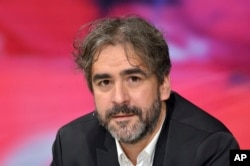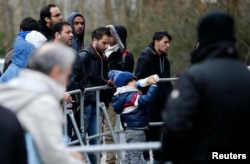Turkish officials have voiced anger at German Chancellor Angela Merkel and her electoral challenger, Martin Schulz, for criticizing Turkey during a televised pre-election debate Sunday.
Turkey’s presidential spokesman, Ibrahim Kalin, tweeted Monday, “We hope that this problematic atmosphere that sacrifices Turkish-German relations caused by a narrow political vision changes soon."
During their debate, Merkel said Turkey should not become a member of the European Union, while Schulz accused Merkel of being weak on Turkey and called for a tougher line.
Kalin's Twitter comments dismissed the debate. “It does not matter which political party will be victorious in the German elections because it is now obvious which mindset will prevail. The fact that neither Merkel nor Schulz addressed discrimination or increasing racism throughout the debate shows what the German policy has come to.”
Post-coup attempt relations
The spokesman accused Germany of harboring Turkey’s enemies. More than 250 Turkish military and diplomatic personnel have applied for refugee status in Germany following a coup attempt last year in Turkey.
In addition, Ankara alleges Berlin is failing to crack down on the PKK insurgent group's activities in Germany. The PKK is designated as a terrorist organization by Turkey, the European Union and United States.
During the past year, relations with the NATO partners have plummeted with Berlin at the forefront of raising human rights over Ankara’s post-coup crackdown.
German concerns have been heightened with the crackdown resulting in the arrest and detention of 10 German citizens, including prominent journalist Deniz Yucel, who has been held without charge for more than 200 days.
Despite protests by Berlin, two more Germans were detained Friday at a Turkish airport on what German authorities call “political reasons.”
Turkish authorities have not commented on the arrests, but Monday one of those held was released, according to a statement by the German Foreign Ministry.
Political columnist Semih Idiz of Al Monitor website warns, "Ankara is ready to further escalate pressure on Berlin, because Merkel appears to be in a weaker position.”
Merkel’s perceived political weakness is due to criticism she has received over the resettlement in Germany of refugees and migrants from the Middle East and Africa.
Meanwhile, Turkey sees its strength in a migration deal Ankara signed in 2016 with the European Union, to effectively act as Europe’s gatekeeper. Since the deal, the number of migrants entering Europe through Turkey has fallen from more than a million a year to only a few thousand.
Trade intact
Ankara perceives that much of the tough language coming from Germany has more to do with politics, than any substantive change in foreign policy. Observers point out despite the tough rhetoric, Merkel has not introduced any significant measures against Turkey, other than a few limited economic measures, in relation to trade credit guarantees.
The two countries enjoy a robust trading relationship, with many Germany companies having long-term significant investments. Despite the current stormy diplomatic relationship, last month Ankara awarded a billion-dollar wind turbine contract to German industrial giant Siemens.
It was a shrewd move, suggests political consultant Atilla Yesilada, of Global Source Partners. “It goes to show how intertwined the Turkish-German relations are and how there are these massive projects that have been in the pipeline for years. Some have matured, some are on the way to maturing and some have yet to start. So we are talking about a massive involvement between the two countries which sometime makes it harder for politicians to play the brinksmanship that they would like to for their public opinion.”
Analysts point out with the differences between Berlin and Ankara continuing to deepen and increasingly on fundamental issues, a confrontation could yet still be looming. “The issue remains there, obviously the sides will have to confront these issues one way or another whatever damage control efforts,” warns columnist Idiz.







